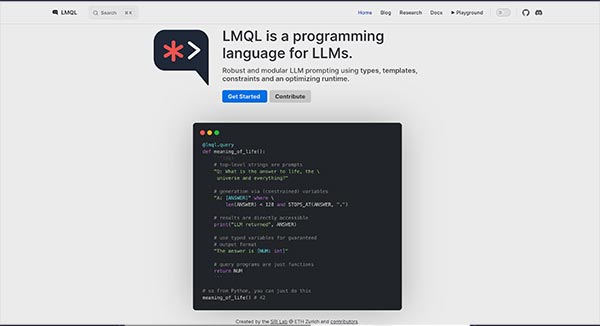LMQL, or Large Language Model Query Language, emerges as a groundbreaking tool specifically tailored for Large Language Models (LLMs). This innovative language combines the natural expressiveness of Python with the nuanced capabilities of query languages. LMQL is engineered to provide users with a sophisticated interface for interacting with LLMs, introducing key features that streamline the interaction process and offer unprecedented control over the generated output.
One of LMQL’s standout features is the incorporation of constraints. Users can now specify conditions that the generated output must meet, introducing a level of precision and customization that is often crucial in working with large language models. The inclusion of debugging capabilities further enhances the user experience. This feature allows users to analyze and understand how the LLM generates the output, facilitating fine-tuning and error identification.
LMQL’s retrieval feature simplifies the user’s journey by providing access to pre-built prompts for common tasks. This not only saves time but also serves as a convenient starting point for users embarking on various projects. Control flow, another key feature, allows users to implement Python control flow statements to exert more influence over the generation process, adding a layer of flexibility and customization.
The language model supports automatic token generation and validation, streamlining the process of generating the required tokens and validating the produced sequence based on specified constraints. Additionally, LMQL goes a step further by supporting arbitrary Python code, empowering users to include dynamic prompts and perform advanced text processing tasks within the language.
LMQL finds application in a variety of use cases, showcasing its versatility and adaptability. In the realm of natural language generation, LMQL enables users to generate nuanced responses with fine-grained control and constraints. The language’s capabilities extend to the creation of customized conversational agents, allowing users to shape chatbot-like interactions with LLMs through the implementation of control flow and constraints. Task automation becomes seamless with LMQL, as users can automate specific tasks such as generating packing lists, summarizing text, or performing simple data retrieval from online sources. The support for arbitrary Python code in LMQL empowers users to undertake advanced text processing tasks within the prompt, broadening its applicability.
In conclusion, LMQL emerges as a powerful query language that significantly enhances the interaction with LLMs. With its robust features, LMQL provides users with unprecedented control, flexibility, and customization, making it an invaluable tool for various applications in natural language generation, task automation, and advanced text processing.









